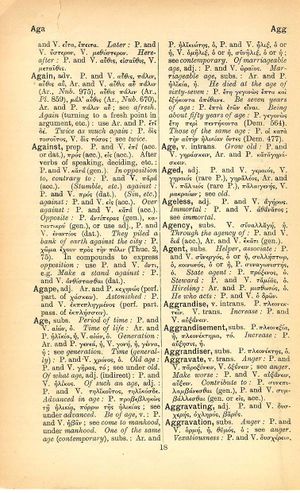against: Difference between revisions
From LSJ
Ἡ γλῶσσ' ἁμαρτάνουσα τἀληθῆ λέγει → Inesse linquae veritas lapsae solet → Die Zunge, wenn sie in die Irre geht, spricht wahr
m (Woodhouse1 replacement) |
mNo edit summary |
||
| Line 15: | Line 15: | ||
[[over against]]: [[prose|P.]] and [[verse|V.]] [[κατά]] (acc.). | [[over against]]: [[prose|P.]] and [[verse|V.]] [[κατά]] (acc.). | ||
[[opposite]]: [[prose|P.]] [[ | [[opposite]]: [[prose|P.]] [[ἀντιπέρας]] (gen.), [[καταντικρύ]] (gen.), or use adj., [[prose|P.]] and [[verse|V.]] [[ἐναντίος]] (dat.). | ||
[[they piled a bank of earth against the city]]: [[prose|P.]] [[χῶμα ἔχουν πρὸς τὴν πόλιν]] ([[Thucydides|Thuc.]] 2, 75). | [[they piled a bank of earth against the city]]: [[prose|P.]] [[χῶμα ἔχουν πρὸς τὴν πόλιν]] ([[Thucydides|Thuc.]] 2, 75). | ||
Revision as of 15:18, 9 June 2020
English > Greek (Woodhouse)
preposition
P. and V. ἐπί (acc. or dat.), πρός (acc.), εἰς (acc.).
after verbs of speaking, deciding, etc.: P. and V. κατά (gen.).
in opposition to, contrary to: P. and V. παρά (acc.).
(stumble, etc.) against: P. and V. πρός (dat.).
(sin, etc.) against: P. and V. εἰς (acc.).
over against: P. and V. κατά (acc.).
opposite: P. ἀντιπέρας (gen.), καταντικρύ (gen.), or use adj., P. and V. ἐναντίος (dat.).
they piled a bank of earth against the city: P. χῶμα ἔχουν πρὸς τὴν πόλιν (Thuc. 2, 75).
in compounds to express opposition: use P. and V. ἀντι, e. g.
make a stand against: P. and V. ἀνθίστασθαι (dat.).

